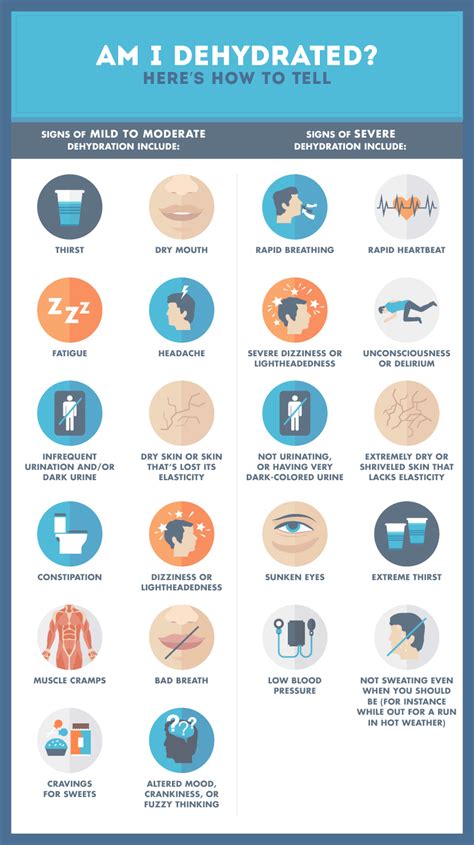10 Sign Of Dehydration

Dehydration, a condition characterized by the body losing more fluids than it takes in, can lead to a range of health issues if not addressed promptly. It’s not just about feeling thirsty; dehydration can affect anyone, regardless of age, gender, or health status. The signs of dehydration can be subtle and may not always be immediately recognized, making it crucial to understand and identify them early. Here are ten key signs that may indicate you or someone else is dehydrated:
Dry Mouth and Thirst: One of the most obvious signs of dehydration is feeling thirsty. When your body loses fluids, it tries to conserve water, leading to a dry, sticky mouth. Thirst is the body’s way of signaling that it needs more fluids.
Fatigue and Weakness: Dehydration can cause fatigue, which is a feeling of being extremely tired. This happens because the body doesn’t have enough fluids to carry out its normal functions, leading to a lack of energy.
Dark Urine: Normally, urine is pale yellow or clear. Dark yellow or amber-colored urine can indicate that the body is not getting enough fluids, as the kidneys concentrate the urine to save water.
Headaches: Dehydration headaches are usually described as feeling like a dull, aching sensation on both sides of the head and can be mild to severe. They occur because the brain temporarily contracts due to dehydration, causing pain.
Dizziness and Lightheadedness: Standing up too quickly or changing positions can lead to feeling dizzy or lightheaded when dehydrated. This happens because dehydration reduces blood volume, leading to a temporary drop in blood pressure.
Muscle Cramps: Dehydration can cause muscle cramps, which are involuntary muscle contractions. This is because muscles need the right balance of fluids and electrolytes (like sodium, potassium, and calcium) to function properly.
Rapid Heartbeat: Dehydration can lead to a rapid heartbeat as the body tries to maintain blood pressure and ensure that the brain and other vital organs receive enough oxygen and nutrients.
Low Blood Pressure: Severe dehydration can cause a significant drop in blood pressure, leading to a condition known as hypotension. Symptoms include dizziness, fainting, and inadequate blood supply to organs.
Decreased Urination: When dehydrated, the kidneys produce less urine to conserve water in the body. If you’re not urinating as frequently as usual or if your urine output has significantly decreased, it could be a sign of dehydration.
Sunken Eyes: In cases of severe dehydration, the eyes may appear sunken. This occurs because the body pulls fluids from various parts, including those around the eyes, to maintain vital functions in other areas.
Understanding Dehydration
Dehydration is more than just a minor discomfort; it can lead to serious complications if left untreated, especially in vulnerable populations such as the elderly, infants, and people with certain chronic diseases. Recognizing these signs early can help in taking prompt action, which typically involves rehydrating by consuming water or electrolyte-rich fluids.
Prevention and Treatment
Preventing dehydration is often straightforward: drink plenty of water and other fluids, and monitor your body’s response to physical activities and environmental conditions, especially in hot weather. For mild dehydration, drinking water or an oral rehydration solution (like a sports drink) usually helps the body replenish lost fluids and electrolytes. However, severe cases of dehydration may require medical attention, including intravenous fluids to rapidly restore the body’s fluid balance.
In conclusion, understanding the signs of dehydration can help in identifying and addressing the condition before it becomes severe. By recognizing these indicators and taking appropriate action, individuals can prevent dehydration from leading to more serious health issues and maintain overall well-being.
What are the primary causes of dehydration?
+The primary causes of dehydration include not drinking enough water, vomiting, diarrhea, excessive sweating, and certain medications. Other factors such as climate, physical activity level, and underlying medical conditions can also play a role.
How can dehydration be prevented?
+Dehydration can be prevented by drinking plenty of water, avoiding excessive alcohol and caffeine, eating hydrating foods, and monitoring urine output. During hot weather or intense physical activity, it's essential to increase fluid intake to match the body's needs.
What are the long-term effects of untreated dehydration?
+Untreated dehydration can lead to serious health complications, including kidney damage, heat stroke, seizures, and even death in extreme cases. It's crucial to address dehydration promptly to prevent these outcomes.
In addressing dehydration, it’s vital to understand the balance between fluid intake and the body’s needs, ensuring that steps are taken to prevent dehydration and to treat it effectively should it occur. By doing so, individuals can mitigate the risks associated with dehydration and maintain optimal health.


